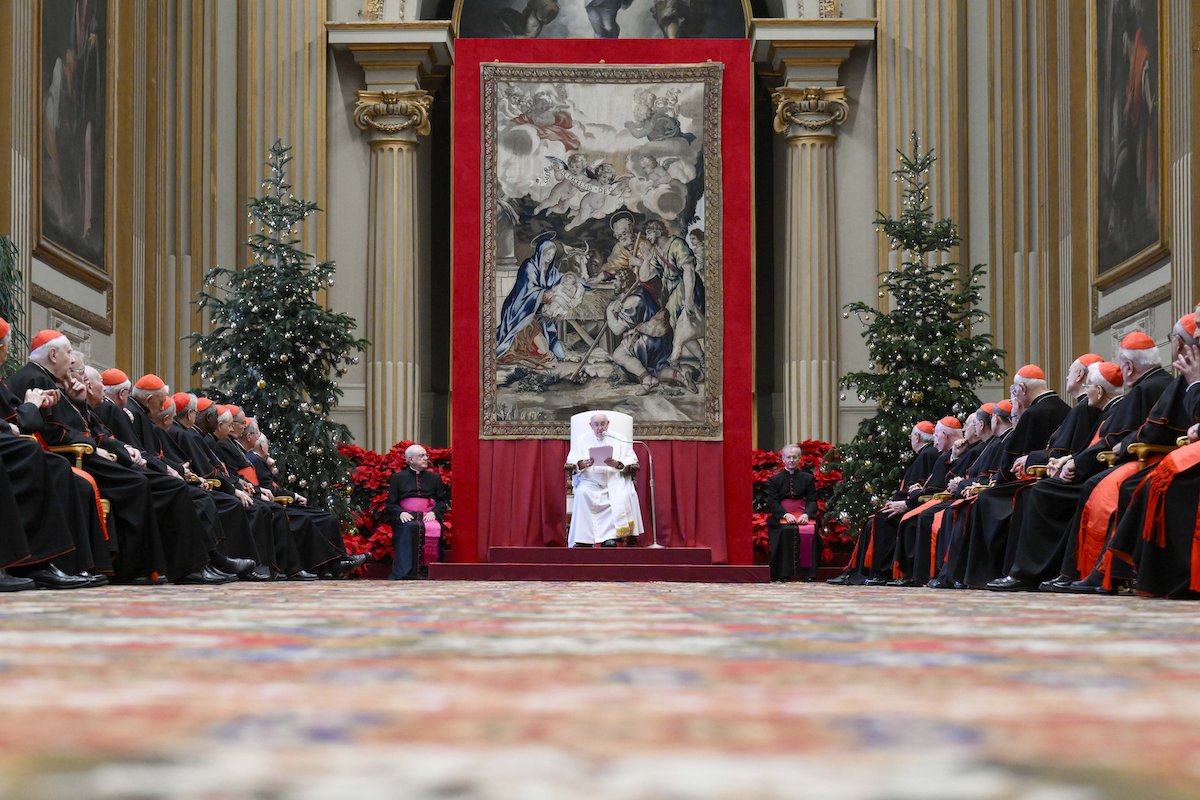By Cindy Wooden, Catholic News Service
VATICAN CITY (CNS) — Every Christian and every Christian community is called to conversion, a process that lasts a lifetime and is needed even more by people who think they are firmly on the path to holiness, Pope Francis told officials of the Roman Curia.
“The opposite of conversion is ‘immobility,’ the secret belief that we have nothing else to learn from the Gospel,” the pope told the cardinals and other top aides Dec. 22 as he met them for his traditional pre-Christmas speech and review of the past year.
Pope Francis went from the meeting in the Hall of Blessings to the Vatican audience hall where he offered his Christmas greetings and prayers for peace and serenity to Vatican employees and members of their families.
The Gospel calls to conversion and to peacemaking, including in one’s relationship with family members and co-workers, were at the center of the pope’s remarks to the Curia.
In October, the church celebrated the 60th anniversary of the opening of the Second Vatican Council, which Pope Francis said was “a great moment of conversion for the entire church.”
“The conversion that the council sparked was an effort to understand the Gospel more fully and to make it relevant, living and effective in our time,” he said, and the process “is far from complete.”
The ongoing reflection on “synodality,” and of ensuring members of the church listen to God and to each other, he said, “is the fruit of our conviction that the process of understanding Christ’s message never ends, but constantly challenges us.”
Conversion, he said, “is not simply about avoiding evil but doing all the good that we can. Where the Gospel is concerned, we are always like children needing to learn. The illusion that we have learned everything makes us fall into spiritual pride.”
Pope Francis said it is an “error” to try “to crystallize the message of Jesus in a single, perennially valid form,” because while the substance of the Gospel remains the same, the forms of expressing and explaining it must deepen over time and must respond to the new needs and challenges of any given age.
“True heresy consists not only in preaching another gospel as St. Paul told us,” he said, “but also in ceasing to translate its message into today’s languages and ways of thinking.”
“‘To preserve’ means to keep alive and not to imprison the message of Christ,” the pope said.
Pope Francis pointed to Jesus’ parables, including the parable of the prodigal son, to explain how those who wander far from God often recognize how they have sinned and then turn back, repentant.
But in the parable, the elder son knows he has stayed home, doing his duty, and so he thinks he is righteous and has no need for conversion.
“Those who remain at home,” he said, often fail to realize the errors of their ways, “convinced that they are mere victims, treated unjustly by constituted authority and, in the last analysis, by God himself.”
Pope Francis told the Curia officials that “at this time in our lives, we need to pay greater attention to the fact that, in a formal sense, we are now living ‘at home,’ within the walls of the institution, in the service of the Holy See, at the heart of the church. Precisely for this reason, we could easily fall into the temptation of thinking we are safe, better than others, no longer in need of conversion.”
In fact, he said, that sense of security means “we are in greater danger than all others, because we are beset by the ‘elegant demon,’ who does not make a loud entrance, but comes with flowers in his hand,” trying subtly to convince one that no further conversion is necessary.
Pope Francis also used the occasion to call attention again to Russia’s war on Ukraine and to the armed conflicts going on in many parts of the world.
“The culture of peace is not built up solely between peoples and nations,” he said. “It begins in the heart of every one of us” by uprooting any hatred or resentment of another person.
Personal peacemaking begins with self-examination, the pope said, urging the officials to ask: “How much bitterness do we have in our hearts? What is feeding it? What is the source of the indignation that so often creates distance between us and fuels anger and resentment? Why is it that backbiting in all its forms becomes our only way of talking about the things around us?”
Peace can be destroyed by “verbal violence, psychological violence, the violence of the abuse of power, the hidden violence of gossip,” he said. “In the presence of the Prince of Peace who comes into the world, let us lay aside all weapons of every kind.”






